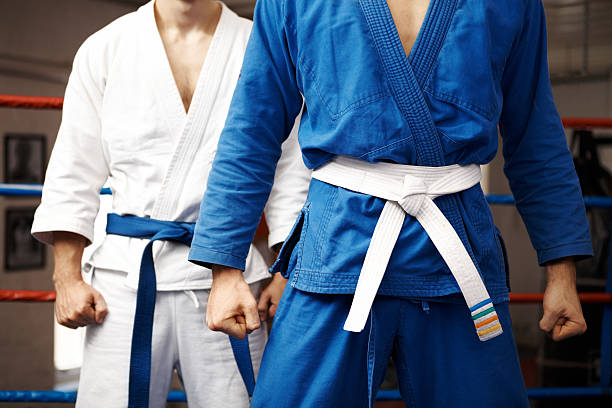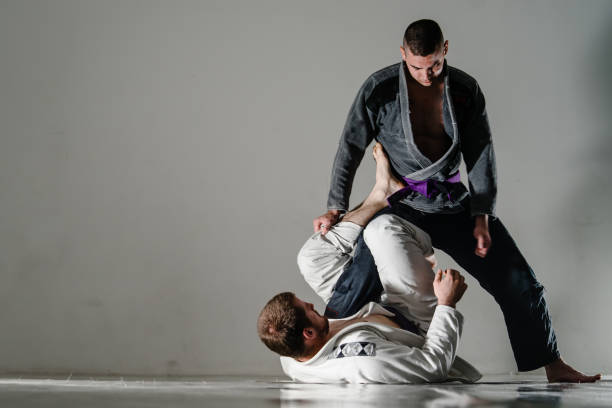Jiu-Jitsu or Taekwondo: Choosing the Right Martial Art for You
Author : Baig Mirza | Published On : 29 Mar 2024
Martial arts have long been revered not just as forms of self-defense, but also as disciplines that promote physical fitness, mental fortitude, and self-discipline. Among the myriad of martial arts styles available today, Jiu-Jitsu and Taekwondo stand out as two popular choices, each with its own unique techniques, philosophies, and benefits. In this blog, we'll delve into the world of Jiu-Jitsu and Taekwondo, exploring their origins, principles, and what sets them apart, to help you make an informed decision on which martial art might be the right fit for you.

Jiu-Jitsu:
Originating in Japan, Jiu-Jitsu, also known as Brazilian Jiu-Jitsu (BJJ), gained prominence for its effectiveness in ground fighting and grappling techniques. Developed by the Gracie family in the early 20th century, BJJ emphasizes leverage, joint locks, and chokeholds to subdue opponents, regardless of their size or strength. Here are some key aspects of Jiu-Jitsu:
Ground Fighting:
Unlike many other martial arts that focus on striking techniques, Jiu-Jitsu places a significant emphasis on ground fighting. Practitioners learn how to control opponents, gain dominant positions, and execute submissions such as arm locks and chokes.
Self-Defense:
Jiu-Jitsu is renowned for its practicality in real-life self-defense situations. By teaching practitioners how to neutralize threats and defend themselves on the ground, BJJ instills confidence and preparedness.
Physical and Mental Benefits:
Training in Jiu-Jitsu offers numerous physical benefits, including improved flexibility, strength, and cardiovascular endurance. Moreover, the mental aspect of BJJ cultivates problem-solving skills, resilience, and a calm mindset under pressure.
Taekwondo:
Originating in Korea, Taekwondo is a dynamic martial art known for its emphasis on kicking techniques, agility, and speed. With a strong focus on discipline and self-control, Taekwondo has become a popular choice for practitioners of all ages. Here's what sets Taekwondo apart:
Kicking Techniques:
Taekwondo practitioners are renowned for their powerful and precise kicks, which are often executed with lightning speed. From front kicks to roundhouse kicks and spinning kicks, Taekwondo offers a wide array of kicking techniques for both offensive and defensive purposes.
Forms (Poomsae):
In addition to sparring and self-defense drills, Taekwondo training includes the practice of forms, known as poomsae. These choreographed sequences of movements help practitioners improve their balance, coordination, and concentration.
Olympic Sport:
One of the distinguishing features of Taekwondo is its status as an Olympic sport. Taekwondo has been included in the Olympic Games since 2000, providing practitioners with opportunities to compete at the highest level on the world stage.

Choosing the Right Martial Art for You:
When it comes to choosing between Jiu-Jitsu and Taekwondo, there is no one-size-fits-all answer. The decision ultimately depends on your personal preferences, goals, and interests. Here are some factors to consider:
Fighting Style:
If you prefer close-quarters combat and grappling techniques, Jiu-Jitsu might be the right choice for you. On the other hand, if you enjoy dynamic kicking techniques and agility-based movements, Taekwondo could be a better fit.
Self-Defense vs. Sport:
While both Jiu-Jitsu and Taekwondo offer effective self-defense skills, they have different focuses. Jiu-Jitsu excels in ground fighting and practical self-defense, whereas Taekwondo emphasizes striking techniques and competition sparring.
Training Environment:
Consider the atmosphere and culture of the martial arts schools or dojos in your area. Visit different academies, observe classes, and speak with instructors to get a sense of the training environment and whether it aligns with your preferences.
If you want to learn techniques and guides related to BJJ go to this site: BJJ Guide
Conclusion:
Whether you choose Jiu-Jitsu or Taekwondo, both martial arts offer a wealth of physical, mental, and emotional benefits. From self-defense skills to improved fitness and personal development, the journey of martial arts training is as rewarding as it is challenging. Ultimately, the best martial art for you is the one that resonates with your goals, interests, and values. So, take the time to explore your options, try out different classes, and embark on a martial arts journey that inspires and empowers you.
Frequently Asked Question’s
Q1. Which is better to learn for self-defense, Taekwondo or Jiu-Jitsu?
Both Taekwondo and Jiu-Jitsu offer valuable skills for self-defense, but they focus on different aspects. Taekwondo emphasizes striking techniques, especially powerful kicks, which can be effective for keeping an attacker at a distance. On the other hand, Jiu-Jitsu specializes in ground fighting, teaching practitioners how to control and subdue opponents using leverage and grappling techniques.
The choice depends on your preferences and the type of self-defense situations you anticipate. For close-quarters combat and ground scenarios, Jiu-Jitsu may be more suitable, while Taekwondo can be effective for maintaining distance and using striking techniques.
Q2. Is Taekwondo or karate better?
The question of whether Taekwondo or karate is better depends on various factors, including personal goals, training environment, and individual preferences. Taekwondo is known for its dynamic kicking techniques and agility, whereas karate emphasizes a combination of punches, kicks, and strikes.
Both martial arts have unique strengths and benefits, such as discipline, fitness, and self-defense skills. It's essential to try classes in both disciplines, observe the teaching style and atmosphere of the dojo, and consider which martial art aligns better with your interests and goals.
Q3. Is Taekwondo good for boys?
Taekwondo is suitable for individuals of all genders, including boys. It offers numerous benefits such as physical fitness, discipline, self-confidence, and self-defense skills. Boys can excel in Taekwondo training, developing coordination, agility, and strength through practicing kicks, punches, blocks, and forms (poomsae). Additionally, Taekwondo promotes values such as respect, perseverance, and sportsmanship, contributing to holistic character development in young practitioners.
Q4. How do I find the best martial art for me?
Finding the best martial art for you involves considering several factors:
Interest and Goals:
Determine whether you are more interested in striking techniques, grappling, self-defense, sport competition, or overall fitness.
Research and Explore:
Research different martial arts styles such as Taekwondo, Jiu-Jitsu, Karate, Muay Thai, etc. Attend trial classes or observe sessions to get a feel for the training environment, teaching style, and curriculum.
Instructor and School:
Look for experienced and reputable instructors who prioritize safety, skill development, and personal growth. Consider the proximity and convenience of the martial arts school or dojo.
Personal Fit:
Reflect on your preferences regarding training intensity, class structure, and cultural aspects of the martial art. Choose a discipline that resonates with your personality and goals.
Trial Period:
Take advantage of introductory offers or trial periods to experience training firsthand before committing to a specific martial art.
Q5. Should I choose BJJ or Taekwondo for self-defense?
The choice between BJJ (Brazilian Jiu-Jitsu) and Taekwondo for self-defense depends on your comfort level with different combat ranges and scenarios. BJJ excels in ground fighting, teaching techniques to control and submit opponents in close-quarters situations. It is highly effective for neutralizing threats without relying on striking.
On the other hand, Taekwondo emphasizes striking techniques, particularly powerful kicks, which can be valuable for creating distance and defending against standing attacks. Consider your preferences, training environment, and the type of self-defense situations you want to prepare for when deciding between BJJ and Taekwondo. Some individuals also choose to train in both disciplines to develop a well-rounded skillset for self-defense.
